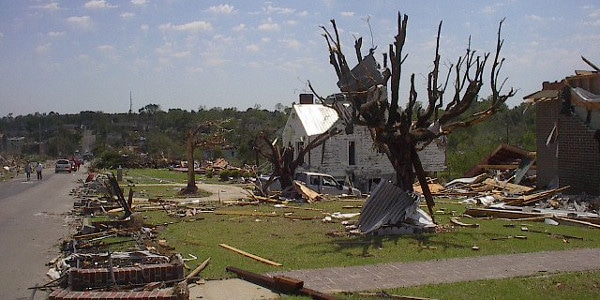Governor Robert Bentley has declared Sunday a day of prayer for victims of the tornados which swept through the south on Wednesday. Alabama is a state where religious faith is ever present and a rallying point for communities. WBHM’s Andrew Yeager offers this glimpse of how churches are weathering the storm.
Bryan Mitchell is trying to give away food and water. He and other volunteers from Birmingham’s Church of the Highlands drive through the hard hit Pratt City neighborhood.
“Yes m’am, we’ve got hamburgers. How many do you need? Just two?”
The pick up truck bed is stacked with not just burgers, but chips, cookies and drinks. Also, ketchup if you need it. Scottie Hill sits in front of her uncle’s damaged home. Her house is next door, cock-eyed on the foundation. Hill says she’s glad to see the church groups, because they’re here to help, not gawk.
“It’s a blessing just for somebody to come by and pass you a bottle of water. And not to mention food and toiletries. The things that you need. So I just consider that a real blessing.”
Church of the Highlands is a 14,000 member suburban mega church. So they’ve deployed people across north central Alabama, working around the clock. Associate Pastor Robert Record is trying to coordinate the efforts.
“The real problem is logistics here, is matching up resources and needs.”
One need might be a ride to a shelter. Or chain saws to cut through trees. Meanwhile, food, water and relief supplies are coming in from across the country.
“By the end of the day Tuesday we’ll have eleven 18-wheelers will have come from Virginia alone.”
Record says that sounds like a lot, but it’ll go straight to victims and first responders. The need is that great.
Many churches around Birmingham are offering food and collecting supplies. Still others are preparing for the next step.
“Good morning! This is my name badge I’m taking off.”
Trisa Moutardier registers at this early response training hosted by First Methodist Church in Alabaster. She’s actually missing her son’s soccer game. The training will create teams to go into disaster areas after first responders have finished their jobs. They’ll help clean up debris, stabilize homes and assess damage. Moutardier has never done this before. So she’s anxious, but hopeful.
“I think that if we go out there and just lend a helping hand I think you feel better about yourself when you help somebody else and there’s a lot of things you can’t do but we can go out and help them.”
Christy Smith runs this workshop for the United Methodist Committee on Relief. She says in a place like Alabama, where people are generally more religious, there is something different about relief work by a church. People expect God’s help.
“We’ll show up at a door and someone will say ‘I’m not surprised to see you. I know God would send someone.'”
But these are all efforts by people mostly left untouched by the storms. That’s not the case with everyone.
“Wow, that’s our church and we’ve been there 30 years.”
Kamisha Quates goes to Bethel Baptist Church. It’s in that decimated Pratt City area of Birmingham. Sanctuary walls are gone. Two by fours and insulation cover the pews. Many of the 2,000 congregants live in the neighborhood, but Quates says miraculously no one from the church died. Bethel will hold a service today at a Fair Park Arena. Quates expects emotions will run from sadness to joy.
“I think we’re gonna have a spirit filled service, you know, a spirit-filled, move-of-God service. At least that’s what I’m hoping for myself.”
Quates says they’ve found a location to meet for the rest of the year and there’s no question they’ll rebuild. They’ve lost the church building, she emphasizes. Not their church.

